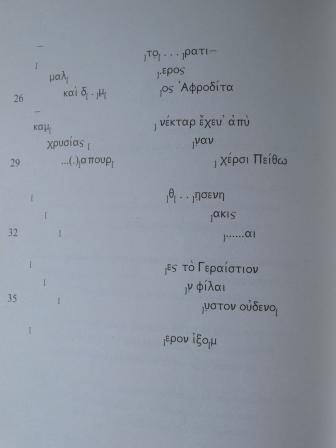Artikel
Festival poet Chus Pato
Poetry and the remainder

29 mei 2012
A fragment, a remnant, a ruin – all form part of a “totality”, they come from the past and head into the future, are an implant of future.
I consider the poem to be a remainder, a remnant. A poem is what remains, the most resistent zone of a language. I consider a poem to be a fragment of a language that inscribes itself in the wake of a catastrophe (catastrophe is always linguistic).
To my mind a poem is an artefact that is never concluded, is always unfinished, and this for various reasons. I will mention two.
One is to agree with Blanchot in his wish that writing exist outside of any possibility of completion, or that it be a continual recommencement (I quote from memory).
And the other is the poem’s condition as a remainder.
I asked, at the beginning of this post, about the possibility of reconstructing the complete work. I’ll now say, to end, that in my opinon no work is finished. I think, rather, that totality does not exist, is not possible, and is not desirable. What exists are fragments, remains, ruins that do not admit to a totality. Any poem is an impossibility of language that does not end, a remain, a survivor, something that has appeared. It is always unfinshed, unconcluded, and free.
The work of Sappho or the Epic of Gilgamesh are examples of incomplete works. History did not allow them to reach us in their entirety – we can only read fragments. We can also ask ourselves if it is possible to reconstruct, to imagine the complete work from a fragment. Is it pertinent to ask ourselves such a question? I won’t answer just yet, but will turn my attention to the word “resto”, which can be translated as remains, remainder, remnant.
A remainder can be something which is no longer useful to us and which we toss in the garbage, or something we put aside where it can’t disturb us, where we won’t trip up against it. But a remainder is also that which endures, that which resists, that which cannot be destroyed, which survives a catastrophe. A remainder can be joined to another remainder or can fall into ruin. For this to happen, in its fall the remnant or remainder must become a monument, common grave, a memory. And still we say: “mortal remains”.A fragment, a remnant, a ruin – all form part of a “totality”, they come from the past and head into the future, are an implant of future.
I consider the poem to be a remainder, a remnant. A poem is what remains, the most resistent zone of a language. I consider a poem to be a fragment of a language that inscribes itself in the wake of a catastrophe (catastrophe is always linguistic).
To my mind a poem is an artefact that is never concluded, is always unfinished, and this for various reasons. I will mention two.
One is to agree with Blanchot in his wish that writing exist outside of any possibility of completion, or that it be a continual recommencement (I quote from memory).
And the other is the poem’s condition as a remainder.
I asked, at the beginning of this post, about the possibility of reconstructing the complete work. I’ll now say, to end, that in my opinon no work is finished. I think, rather, that totality does not exist, is not possible, and is not desirable. What exists are fragments, remains, ruins that do not admit to a totality. Any poem is an impossibility of language that does not end, a remain, a survivor, something that has appeared. It is always unfinshed, unconcluded, and free.
© Chus Pato
Sponsors












Partners
LantarenVenster – Verhalenhuis Belvédère

